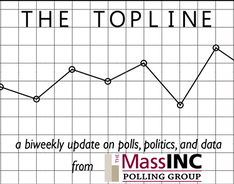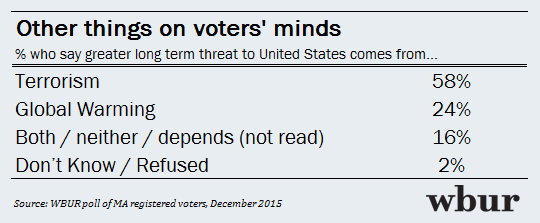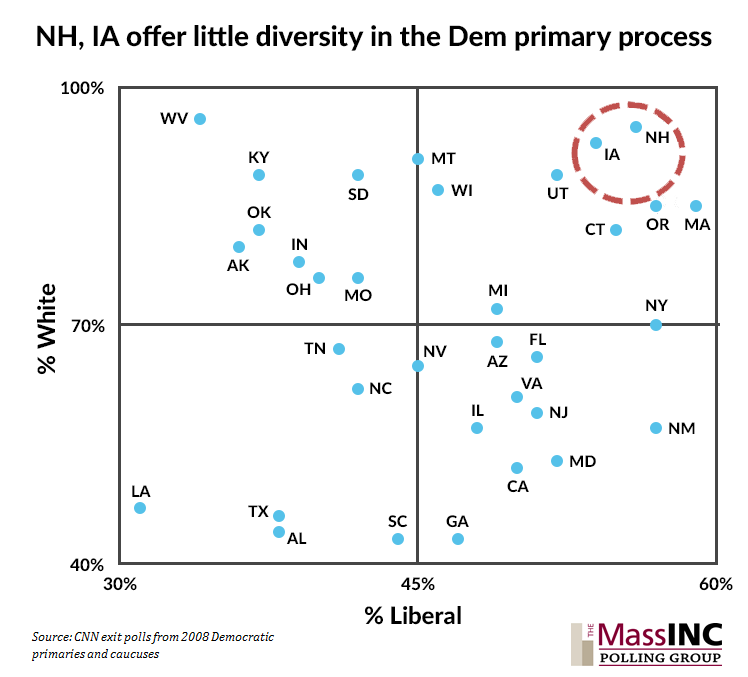Our next WBUR New Hampshire Republican primary poll will be released later this week. In the meantime, here are some excerpts from MPG in the news: articles about our latest WBUR polling, and our analysis for WBUR’s Politicker and for New Hampshire Public Radio.
Polling Shows Little Urgency From Mass. Voters On Climate Change
“Paris has been in the news for two reasons in the past month – but only one has really broken through with voters here in Massachusetts.
“According to our recent WBUR poll, more than three-fifths (62 percent) of voters say they have been following the news about the terrorist attacks in Paris “very closely.” Only 19 percent say the same about the international climate change summit currently underway in the city.
“This is not new. It fits into a larger pattern among Massachusetts voters of casual disconnectedness toward climate change, a trend we have been tracking since 2011.”
WBUR Poll: On Syrian Refugees, Mass. Voters Split Along Party Lines
“Massachusetts voters have conflicting feelings when it comes to Syrian refugees and their vetting by the U.S. government, despite recent federal efforts to better explain how refugees are screened, a WBUR survey has found. And those feelings are largely divided along party lines. …
“A plurality of Massachusetts voters, 46 percent, say they do not believe the vetting process for Syrian refugees is sufficient. But a slight majority, however (54 percent), say Syrian refugees who pass that exact U.S. government’s screening process should be accepted into the state.”
Analysis: Why The GOP Presidential Candidates Shouldn’t Ignore Mass.
“… You might think, then, that Massachusetts would be a natural stop for candidates stumping all over our neighbor to the north. Greater Boston even shares a media market with New Hampshire, meaning Massachusetts voters will be collateral damage in the coming TV ad war. Indeed, most of the ads Boston voters will see are actually targeted at southern New Hampshire.
“But most GOP candidates are completely ignoring Massachusetts. In the past three months, the 14 remaining Republican candidates for president have made 275 campaign stops in New Hampshire. In Massachusetts, they have made five, and two of those were made by [Donald] Trump.”
Sorry, N.H. Democrats, But It’s Time You Lost Your First-Place Presidential Primary
“It’s time for Democrats to ditch Iowa and New Hampshire’s one-two punch at the front of the party’s presidential nominating calendar.
“The reason for my suggestion is basic demographics. New Hampshire and Iowa have been growing apart from the rest of the Democratic primary for years. The two states’ overwhelmingly white, liberal primary electorates are not remotely representative of Democratic primary voters in the rest of the country, or of the general electorate. They look different, act differently, and care about different things.”
– – – – – – – – – – – – – – – – – – – – NERD ALERT TEARLINE – – – – – – – – – – – – – – – – – – – – –
As noted in the Nerd Alert Tearline months ago and written about by us for CommonWealth Magazine, there is growing evidence of what pollsters would call a “mode effect” in Donald Trump’s support numbers. Basically, Trump does better in polls conducted online or in automated phone “robopolls” than he does in polls conducted with live interviewers. One hypothesis is that voters feel freer to express their preference for Trump in an automated format; in other words, some portion of voters are ashamed to admit their Trump support to another actual human being.
Last week FiveThirtyEight’s Harry Enten wondered what this discrepancy means for the future of online polling, which is largely untested in presidential primaries. In doing so he revisited something we noted in our CommonWealth piece: that online polls overstated the support of candidates who “surged” in the 2012 Republican primary as well. For instance, businessman Herman Cain’s brief time at the top of the GOP field can be attributed almost entirely to his lead in online polls.
The big questions for pollsters are whether the online and live-interviewer polls will converge around a number for Trump’s level of support, and if not, which will come closest to the actual figure when voters finally start going to the polls? We’ll know soon enough; both the Iowa caucuses and the New Hampshire primary are less than two months away.


